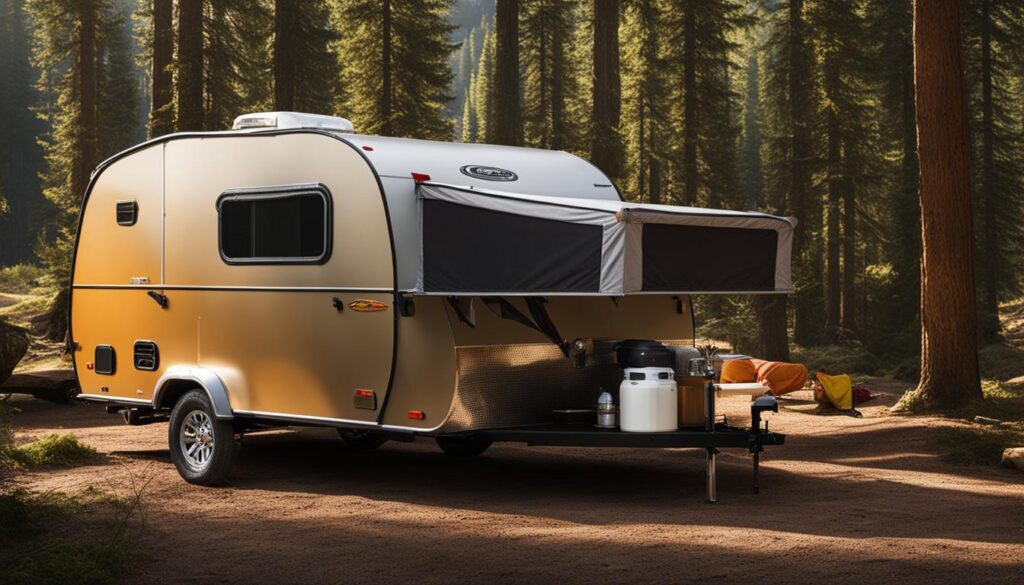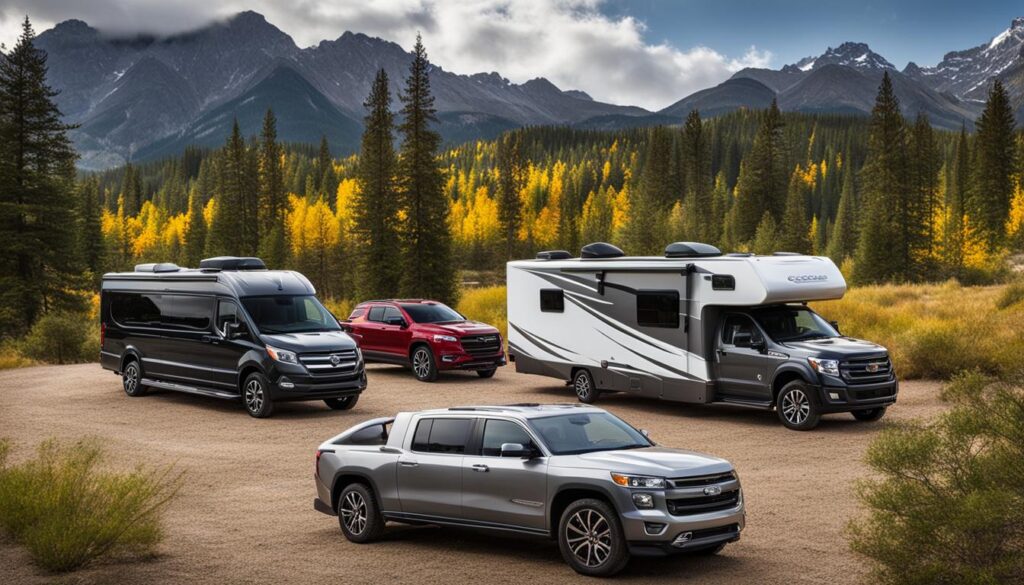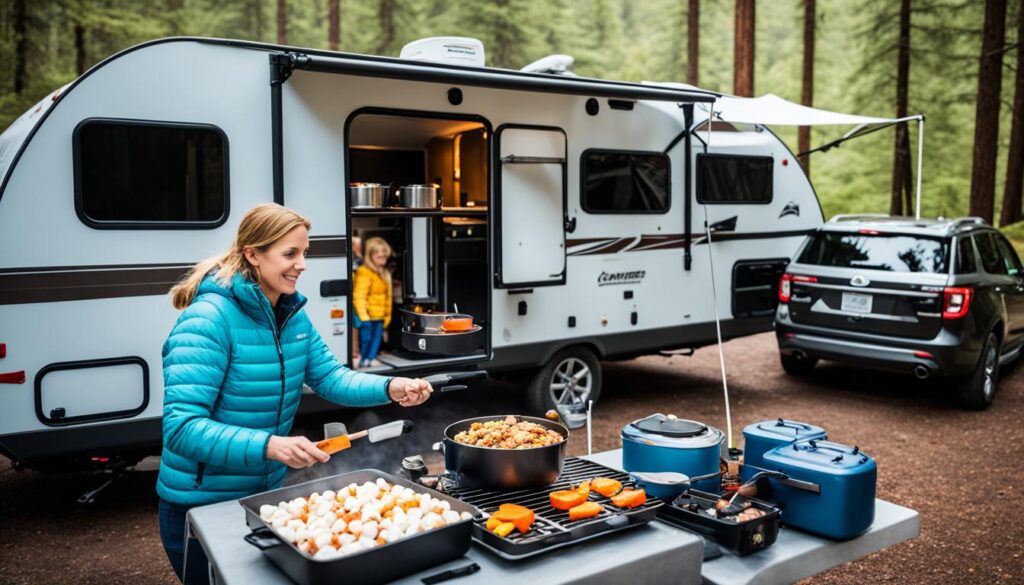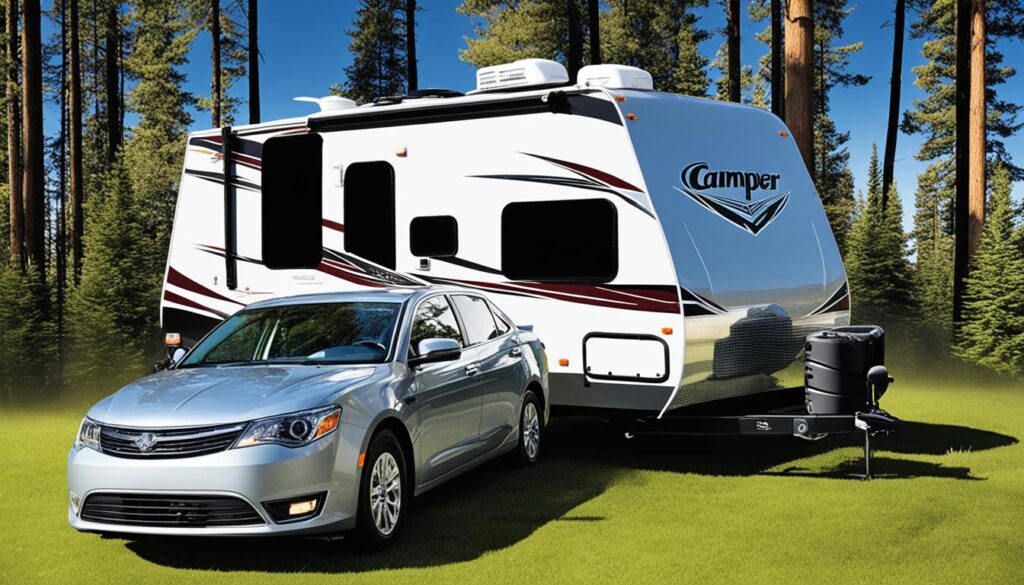Camper or RV? Are they the same thing or is there a significant difference between the two? Many people use these terms interchangeably, but it’s essential to understand the distinctions. So, what exactly is a camper, and how does it differ from an RV?
Join me as we delve into the world of campers and RVs, exploring their unique features, pros and cons, and ultimately, helping you make an informed decision for your camping or road trip adventures.
Key Takeaways:
- A camper typically refers to an RV that is towed behind a separate vehicle, while an RV can be driven independently.
- Campers are compact and lightweight, suitable for towing behind a car or truck, while RVs offer more spacious interiors and amenities.
- Consider factors such as camping style, travel plans, budget, and towing capacity when choosing between a camper and an RV.
- Both campers and RVs have their advantages and disadvantages, so it’s important to evaluate your needs and preferences.
- There is no definitive answer to which is better – it depends on individual preferences and requirements.
Contents
Types of Campers
When it comes to campers, there are various types to choose from, each offering unique features and amenities. Whether you’re a solo traveler or have a family in tow, there’s a camper that suits your needs. Let’s explore some of the most popular camper types:
1. Pop-Up Trailer
If you’re looking for a lightweight and compact option, a pop-up trailer might be perfect for you. These campers typically measure 8 to 16 feet in length and can be easily folded up for towing and storage. While smaller models may have limited amenities, larger ones can include bathrooms, kitchens, and multiple sleeping areas.
2. Travel Trailer
Travel trailers are non-folding camper trailers that come in a range of lengths, from 10 to 40 feet. They can vary in weight and size, from lightweight options to larger, more luxurious models. Travel trailers can be towed by heavy-duty vehicles capable of handling the weight, giving you the flexibility to choose the size and features that suit your needs.
3. Fifth Wheel Camper
If you’re looking for a camper that offers comparable comfort, sleeping space, and amenities to larger RVs, a fifth wheel camper is worth considering. These campers range from 22 to 40 feet in length and require a special hitch. They can only be towed using full-size trucks with heavy-duty towing capacity, making them an excellent choice for those who prioritize space and luxury.
4. Truck Camper
A truck camper is a compact and versatile option that fits inside the bed of a pickup truck. While typically smaller in size, these campers can still offer basic amenities such as a bed and kitchen space. They can be easily unloaded from the vehicle, allowing you to use them as standalone campers when you reach your destination.
Remember, each type of camper has its own advantages and considerations. Consider your camping style, the number of people traveling with you, and the amenities you prioritize when choosing the camper that best fits your needs. Now, let’s take a closer look at different types of RVs in the next section.

Types of RVs
RVs, or recreational vehicles, come in various types and classes, each offering unique features and accommodations. Whether you’re looking for a luxurious motorhome or a compact camper van, there’s an RV that can suit your needs.
Class A Motorhome
The Class A motorhome is the epitome of luxury and comfort on the road. These RVs are typically large and built on commercial bus chassis, industrial vehicles, or car frameworks. With their spacious interiors, ample storage, and various amenities, Class A motorhomes provide a home-like experience. They can range in length and can accommodate up to 10 people. However, they tend to be more expensive than other RV types and require experienced driving skills.
Class B Motorhome
If you’re looking for a compact and easy-to-drive RV, the Class B motorhome, also known as a camper van, might be the perfect choice. Built on van chassis, these RVs are small but efficient. Class B motorhomes are affordable, fuel-efficient, and offer excellent maneuverability. While they may have limited space, they typically include essential amenities such as a bed and a kitchenette. Class B motorhomes are ideal for solo travelers or couples who prioritize mobility and convenience.
Class C Motorhome
The Class C motorhome strikes a balance between size and amenities. These RVs feature a distinctive sleeping space that protrudes over the driving cab, providing additional sleeping capacity. Class C motorhomes are less expensive than Class A motorhomes but offer more interior space than Class B motorhomes. They are popular among couples and families who want a comfortable and affordable RV experience. Class C motorhomes can accommodate multiple people and come with various amenities for a convenient on-the-road lifestyle.

Pros and Cons of Campers
When deciding between a camper and an RV, it’s important to carefully consider the advantages and disadvantages of campers. Here are some key points to keep in mind:
Advantages of Campers
- Compact and lightweight: Campers are designed to be smaller and lighter than larger RVs, making them easier to tow and maneuver. This can be beneficial for those who prefer a more agile and versatile camping experience.
- Lower cost: Campers are generally more affordable compared to larger, more luxurious RVs. They offer a budget-friendly option for individuals or families looking to enjoy the camping lifestyle without breaking the bank.
- Flexibility in transportation: One of the major advantages of campers is that they can be easily unhitched at a campground, allowing you to use your towing vehicle for other purposes, such as exploring the local area or running errands.
- Essential amenities: While campers may not offer all the bells and whistles of larger RVs, many models still provide basic amenities such as comfortable beds, functional kitchens, and adequate storage space.
Disadvantages of Campers
- Limited space: Due to their compact size, campers tend to have less interior living space compared to larger RVs. This can be a disadvantage for individuals or families who prefer more room to move around and store their belongings.
- Less luxurious: Campers often lack the luxurious features and high-end finishes found in larger, more expensive RVs. If you prioritize luxury and comfort during your camping trips, a camper may not fulfill your expectations.
- Minimal amenities: While some campers offer essential amenities, it’s important to note that not all models come equipped with full bathrooms or spacious kitchens. This may require you to make some compromises in terms of comfort and convenience.
When choosing between a camper and an RV, carefully evaluate your camping needs and preferences to determine which option aligns best with your lifestyle and budget.

Pros and Cons of RVs
When considering a recreational vehicle (RV) for your camping or road trip adventures, it’s important to weigh the advantages and disadvantages. RVs come with their own set of unique benefits and drawbacks that can help inform your decision-making process. Here are the pros and cons of RVs:
Advantages of RVs:
- Spacious Interior: RVs offer ample living and storage space, providing you with room to relax and store your belongings during your travels.
- Wide Range of Amenities: From fully-equipped kitchens to comfortable sleeping areas and bathrooms, RVs provide a wide range of amenities to enhance your camping experience.
- Comfort and Luxury: RVs can provide a more comfortable and luxurious camping experience, allowing you to enjoy the comforts of home while exploring the great outdoors.
- Suitable for Longer Trips or Larger Groups: With their larger size and capacity, RVs are well-suited for longer trips or accommodating larger groups of travelers.
Despite the advantages, it’s also essential to consider the potential drawbacks or disadvantages of RVs:
Disadvantages of RVs:
- Higher Cost: RVs can come with a higher upfront cost compared to other camping options, and they may also require additional expenses for fuel, maintenance, and campground fees.
- Fuel Efficiency: RVs, especially larger motorhomes, tend to be less fuel-efficient compared to smaller, more compact camping options.
- Driving and Maneuverability: Operating a larger RV requires some experience and skill, as they can be more challenging to drive and maneuver compared to smaller vehicles.
Ultimately, the decision to choose an RV depends on your specific preferences, travel plans, and budget. An RV can provide a comfortable and convenient camping experience, but it’s essential to carefully consider both the advantages and disadvantages before making your choice.
Choosing Between Camper and RV
When deciding between a camper and an RV, there are several factors to consider:
- Camping Style: Think about your preferred camping style and the level of comfort you desire. If you prefer a more minimalist and compact camping experience, a camper may be the better choice. If you enjoy more amenities and space, an RV may be the way to go.
- Travel Plans: Consider your travel plans and destinations. If you plan on exploring remote or off-grid locations, a camper’s compact size and off-road capabilities may be advantageous. However, if you plan on staying at established campgrounds with full hookups and amenities, an RV may offer a more comfortable experience.
- Budget: Determine your budget for purchasing or renting a camper or RV. Campers generally have a lower upfront cost and can be more affordable to maintain. RVs, especially larger motorhomes, can be more expensive upfront and require additional expenses for fuel, maintenance, and campground fees.
- Towing Capacity: Assess your vehicle’s towing capacity and ensure it can safely tow the size and weight of the camper or RV you are considering. It’s crucial to have a proper tow vehicle to ensure safe and efficient towing.
By carefully evaluating these factors, you can make an informed decision that aligns with your camping preferences, travel plans, and budget constraints.
| Camper | RV | |
|---|---|---|
| Camping Style | A minimalist and compact camping experience | More amenities and space |
| Travel Plans | Exploring remote or off-grid locations | Staying at established campgrounds with full hookups and amenities |
| Budget | Lower upfront cost and more affordable maintenance | Higher upfront cost and additional expenses |
| Towing Capacity | Suitable for towing behind a car or truck | Requires a vehicle capable of towing the RV’s weight |
Camper vs RV: Which is Better?
When it comes to choosing between a camper and an RV, there is no definitive answer. The better option depends on individual preferences, travel plans, and budget. Let’s take a closer look at the advantages and considerations of each:
If You Prioritize Mobility and Flexibility: Camper
Camper vans are the epitome of mobility and flexibility. They are compact, lightweight, and perfect for off-road adventures. If you enjoy exploring rugged terrains and remote locations, a camper is the ideal choice. With their smaller size, campers are easier to maneuver, allowing you to access more secluded camping spots. Additionally, campers are more affordable both in terms of upfront costs and ongoing expenses, making them an attractive option for budget-conscious travelers.
If You Value Spaciousness and Comfort: RV
If spaciousness and comfort are your top priorities, an RV is the better option. RVs offer larger living spaces, ample storage capacity, and a wide range of amenities. They provide a luxurious camping experience, with features like full-sized kitchens, bathrooms, and sleeping quarters. With their self-contained design, RVs allow you to drive and camp in the same vehicle, eliminating the need for separate towing. However, it’s important to note that RVs require a more significant upfront investment and can be less fuel-efficient. Maneuvering them can also pose challenges, especially in tight spaces.
Ultimately, the choice between a camper and an RV depends on your personal preferences and travel style. Consider factors such as your desired level of comfort, need for mobility, and budget constraints. Both options offer unique advantages and can provide unforgettable experiences on the road. Whether you decide to embark on rugged adventures with a camper or enjoy a more spacious and luxurious RV getaway, the most important thing is to choose the option that aligns with your camping aspirations.
Making an Informed Decision
When considering whether to choose a camper or an RV, it’s crucial to thoroughly assess your personal needs and preferences. Take into account factors such as your camping style, travel plans, budget, and towing capacity. By conducting thorough research and exploring various options, you can find the perfect fit that meets all your requirements. Both campers and RVs offer distinct advantages and can contribute to unforgettable experiences on the open road.
Your camping style greatly influences the choice between a camper and an RV. If you prefer a more minimalist and compact camping experience, a camper may be the better option for you. Conversely, if you desire additional amenities and more space, an RV might provide the comfort you seek.
Additionally, consider your travel plans before making a decision. If you’re planning to explore remote or off-grid locations, a camper’s compact size and off-road capabilities can prove beneficial. However, if your itinerary includes established campgrounds with full hookups and amenities, an RV may offer a more comfortable experience.
Your budget also plays a significant role in determining the best choice for you. Campers generally have lower upfront costs and are more affordable to maintain. On the other hand, RVs, especially larger motorhomes, require a more substantial initial investment and entail additional expenses such as fuel, maintenance, and campground fees.
Finally, ensure that your vehicle’s towing capacity can safely handle the size and weight of the camper or RV you’re considering. It’s crucial to have a suitable tow vehicle to ensure a safe and efficient towing experience.
FAQ
What is the difference between a camper and an RV?
While an RV is a broad term that encompasses various recreational vehicles, a camper typically refers to RVs that are towed behind a separate vehicle.
What are the types of campers available?
There are several types of campers, including pop-up trailers, travel trailers, fifth wheel campers, and truck campers.
What are the types of RVs?
The types of RVs include class A motorhomes, class B motorhomes (camper vans), and class C motorhomes.
What are the advantages of campers?
Some advantages of campers include being compact and lightweight, less expensive compared to larger RVs, and offering the flexibility to unhitch at a campground.
What are the advantages of RVs?
RVs offer a spacious interior with ample living and storage space, a wide range of amenities, and a more comfortable and luxurious camping experience.
How do I choose between a camper and an RV?
When choosing between a camper and an RV, consider factors such as your camping style, travel plans, budget, and towing capacity.
Which is better, a camper or an RV?
The choice between a camper and an RV depends on individual preferences, travel plans, and budget.
How can I make an informed decision between a camper and an RV?
To make an informed decision, carefully evaluate your needs and preferences, research different options, and consider factors such as camping style, travel plans, budget, and towing capacity.






